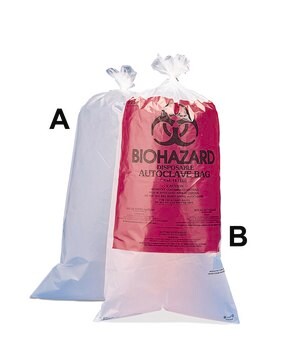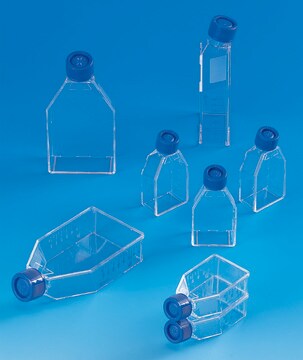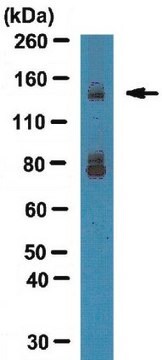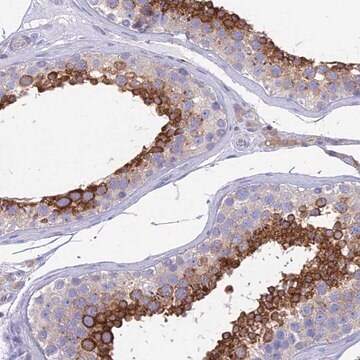79189
Abberior® FLIP 565, NHS ester
for single-molecule switching microscopy (e.g. PALM, STORM, GSDIM)
Se connecterpour consulter vos tarifs contractuels et ceux de votre entreprise/organisme
About This Item
Code UNSPSC :
12352200
Produits recommandés
Forme
solid
Concentration
≥60.0% (degree of coupling)
Solubilité
DMF: 1 mg/mL, clear
Fluorescence
λem 580 nm±5 nm in PBS, pH 7.4
Température de stockage
−20°C
Description générale
Absorption Maximum (off-state) λmax:314 nm (PBS, pH 7.4)
Extinction Coefficient, ε(λmax): 47,000 M-1cm-1 (MeOH)
Fluorescence Maximum, λfl:580 nm (PBS, pH 7.4)
Photoactication Wavelength: 310-380 (one-photon activation)
650-800 (two-photon activation)
Fluorescence Quantum Yield, η: 0.38 (PBS, pH 7.4)
Extinction Coefficient, ε(λmax): 47,000 M-1cm-1 (MeOH)
Fluorescence Maximum, λfl:580 nm (PBS, pH 7.4)
Photoactication Wavelength: 310-380 (one-photon activation)
650-800 (two-photon activation)
Fluorescence Quantum Yield, η: 0.38 (PBS, pH 7.4)
Application
Abberior® FLIP 565 conjugated with secondary antibody has been used for STORM (stochastic optical reconstruction microscopy) imaging of COS-7 and S180 cells.
Adéquation
Designed and tested for fluorescent super-resolution microscopy
Autres remarques
Informations légales
abberior is a registered trademark of Abberior GmbH
Produit(s) apparenté(s)
Réf. du produit
Description
Tarif
Code de la classe de stockage
13 - Non Combustible Solids
Classe de danger pour l'eau (WGK)
WGK 3
Point d'éclair (°F)
Not applicable
Point d'éclair (°C)
Not applicable
Certificats d'analyse (COA)
Recherchez un Certificats d'analyse (COA) en saisissant le numéro de lot du produit. Les numéros de lot figurent sur l'étiquette du produit après les mots "Lot" ou "Batch".
Déjà en possession de ce produit ?
Retrouvez la documentation relative aux produits que vous avez récemment achetés dans la Bibliothèque de documents.
Remi Galland et al.
Nature methods, 12(7), 641-644 (2015-05-12)
Single-objective selective-plane illumination microscopy (soSPIM) is achieved with micromirrored cavities combined with a laser beam-steering unit installed on a standard inverted microscope. The illumination and detection are done through the same objective. soSPIM can be used with standard sample preparations
S W Hell et al.
Optics letters, 19(11), 780-782 (1994-06-01)
We propose a new type of scanning fluorescence microscope capable of resolving 35 nm in the far field. We overcome the diffraction resolution limit by employing stimulated emission to inhibit the fluorescence process in the outer regions of the excitation
Marcus Dyba et al.
Nature biotechnology, 21(11), 1303-1304 (2003-10-21)
We report immunofluorescence imaging with a spatial resolution well beyond the diffraction limit. An axial resolution of approximately 50 nm, corresponding to 1/16 of the irradiation wavelength of 793 nm, is achieved by stimulated emission depletion through opposing lenses. We
Tim Grotjohann et al.
Nature, 478(7368), 204-208 (2011-09-13)
Lens-based optical microscopy failed to discern fluorescent features closer than 200 nm for decades, but the recent breaking of the diffraction resolution barrier by sequentially switching the fluorescence capability of adjacent features on and off is making nanoscale imaging routine. Reported
Stefan W Hell
Nature biotechnology, 21(11), 1347-1355 (2003-11-05)
For more than a century, the resolution of focusing light microscopy has been limited by diffraction to 180 nm in the focal plane and to 500 nm along the optic axis. Recently, microscopes have been reported that provide three- to
Notre équipe de scientifiques dispose d'une expérience dans tous les secteurs de la recherche, notamment en sciences de la vie, science des matériaux, synthèse chimique, chromatographie, analyse et dans de nombreux autres domaines..
Contacter notre Service technique






